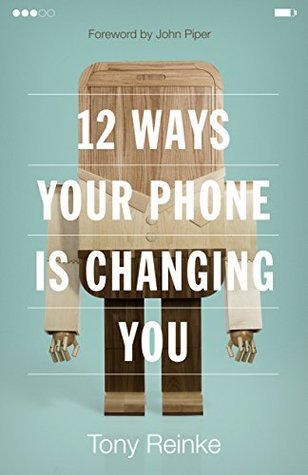More on this book
Community
Kindle Notes & Highlights
Unknown to me at the time I was unboxing my first iPhone, Jobs was actively shielding his children from his digital machines.
What happens to us when we are in constant motion—when we are almost addicted to constant visual stimulation? What is this doing to us? That is the big question.”
but “social media are largely what we make of them—escapist or transforming depending on what we expect from them and how we use them.”
Jacob Weisberg, “We Are Hopelessly Hooked,”
Nicholas Carr, The Shallows: What the Internet Is Doing to Our Brains
Technology is used to subdue creation for human good, but also to increase efficiency.
Feel the brevity of life, and it will make you fully alive.19
True distractions include anything (even a good thing) that veils our spiritual eyes from the shortness of time and from the urgency of the season of heightened expectation as we await the summing up of all history.
Texting and driving is such a commonplace habit, the stats are now canonical. Talking on the phone while driving a vehicle makes you four times more likely to get into an accident, but texting while driving makes your chance of a crash twenty-three times more likely.
Journalist Matt Richtel wrote A Deadly Wandering to answer these questions after investigating a 2006 crash caused by a college student who was texting
Our typing thumbs lack empathy without living faces in front of us. It is much easier to slander an online avatar than a real-life brother.
The dominance of images in the media (and now a hyperabundance of digital images) meant that waves of celebrities could be created, rejected, and replaced. We turned to celebrities who were “fabricated on purpose to satisfy our exaggerated expectations of human greatness.”
The narcissism that can be characteristic of romantic ideals—romantic ideals that can actually drive us away from our real partners into escapist and emotionally comforting reveries—can also cause us to replace the concrete relationships of our given contexts with idealized communities in which we can forgo the struggles associated with the transformation of actual communities and the need to adapt to and be vulnerable to others.14
is the act of being satisfied with Christ, says John Piper, “and if you are bent on getting your satisfaction from scratching the itch of self-regard, people’s affirmation, you will turn away from Jesus, because you can’t serve two masters.”
Smartphones prick the primitive human impulse for appreciation—self-replication in order to be seen, known, and loved—through constant contact with other seekers of affirmation. This is one reason why we find it so hard to put our phones away. We fear one another, and we want admiration from one another, so we cultivate an inordinate desire for human approval through our social media platforms.
the literacy problem we face today is not illiteracy but aliteracy, a digital skimming that is simply an attempt to keep up with a deluge of information coming through our phones rather than slowing down and soaking up what is most important.
“The more time I spend reading ten-second tweets and skimming random articles online, the more it affects my attention span, weakening the muscles I need to read Scripture for long distances.”
Our joy in God is at stake. In our vanity, we feed on digital junk food, and our palates are reprogrammed and our affections atrophy.
And when it comes to serious literacy, the faithful church is counterculturally positioned for success, because solid expositional preaching is essentially a model of healthy, slow reading.
“People used to do things and then post them, and the approval you gained from whatever you were putting out there was a byproduct of the actual activity. Now the anticipated approval is what’s driving the behavior or the activity, so there’s just sort of been this reversal.”
“Compulsive social-media habits are a bad trade: your present moment in exchange for an endless series of someone else’s past moments.”
what we think others think of us profoundly shapes our sense of identity and our search for belonging.
“People in New York City like to think, ‘We’re individuals. People here can decide what they want to be and do it.’ That’s not true,” he corrected. “You all have your uniforms. Some of you are wearing Wall Street uniforms. Some of you are wearing East Village uniforms. Some of you are wearing SoHo uniforms. There are uniforms! You have to fit in. You have to get your validation from somebody. You have to have a group of people that say, ‘You’re one of us.’”2 At the core of our lives, we want to fit in to find our identity.
if people see us bored with God, absorbed with ourselves, and conformed to worldly celebrities, they will not see the image of Jesus reflected in
Amusing Ourselves to Death, Neil Postman
Merely amassing data, he warned, “leads to overload and confusion, a sort of mental pollution.”
We can boil down our core online fears to two anxieties, says theologian Kevin Vanhoozer: “status anxiety (what will people think of me?), and disconnection anxiety (‘I connect, therefore I am’).”
Charles Spurgeon: “The easiest work in the world is to find fault.”
Faultfinding destroys our love for others.
Technology makes life easier, but immaturity makes technology self-destructive.
While our techniques of control do not make us atheists, they do seem to make worship more and more irrelevant, as God is more and more displaced from our lives.
Chesterton confronted technological amnesia in a column about modern marvels, titled “Our Indifference to Wonders.”


